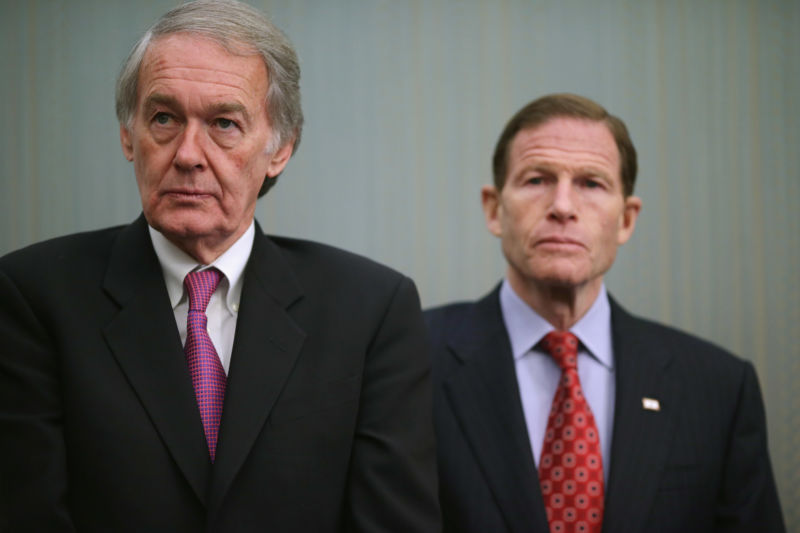May 30, 2018 at 11:06AM
via Ars Technica

Chip Somodevilla/Getty Images
In the last couple of years, companies like Uber, Waymo, and GM's Cruise have been testing more and more self-driving vehicles on public roads. Yet important details about those tests have been kept secret.
Two Democratic senators are determined to change that. Last Friday, they sent out letters to 26 car and technology companies seeking details about their testing activities—part of a broader investigation into the safety of driverless vehicles.
"In March, a pedestrian in Tempe, Arizona, was tragically struck and killed by a vehicle operating under autonomous technology," wrote Sen. Ed Markey (D-Mass.) and Sen. Richard Blumenthal (D-Conn.) in their letter to Uber. "The latest fatality has raised many questions about the processes companies have in place to guard public safety when testing this type of technology on public roads."
The senators then posed a series of questions that, if answered fully, would give the public much greater understanding of the driverless car testing process in the United States:
- The senators requested details on where and when the vehicles were being tested—and how Uber determined that they were safe enough to test on public roads.
- They sought details on how safety drivers are hired, trained, and supervised—and why Uber recently switched from having two people in each test car to a single safety driver.
- They asked if Uber limits the hours of drivers to ensure they will remain alert behind the wheel.
- The senators asked for details about "disengagements"—incidents where a driver had to take over control for safety or other reasons.
- They asked about "concerns raised by employees about your company's safety protocols"—and how the company has addressed those concerns.
The senators haven't published copies of their letters to other car companies, but their press release suggests that those companies received similar questions. Other companies getting letters include Waymo, GM (whose Cruise subsidiary is a leading autonomous vehicle developer), Intel (whose subsidiary, Mobileye, is a leading provider of driver-assistance technology), Ford, Tesla, Nvidia, and a bunch of other car and technology companies.
Companies say they are working on responses.
"Safety remains our top priority as we test our self-driving technology and we will continue to engage lawmakers as we work toward safely launching a commercial service in 2019," a Cruise spokesperson told Ars.
Waymo told Ars that it was reviewing the letter, while Uber said it had received their letter and was planning to respond.
The Trump administration hasn't made transparency a priority
Some of the information requested in the letters has already been disclosed to officials in California, a state that regulates self-driving cars more rigorously than most. Car companies must already inform California authorities about the number of safety-related disengagements that have occurred in the state. And a number of companies have provided California regulators with details about their safety driver testing plans—information that was published by the Financial Times earlier this month.
But to a large extent, California's transparency requirements only apply to testing in California. We know very little about testing activities in other states—including in Arizona, the site of the fatal Uber crash and where Waymo has done extensive testing in preparation for launching a commercial service in the Phoenix area later this year. Markey and Blumenthal are seeking to bring some transparency to testing programs nationwide.
The National Highway Traffic Safety Administration has broad authority to seek this kind of information from companies in the car business. But under the Trump administration, NHTSA has taken a hands-off approach. Companies have been free to test self-driving cars on public roads without significant federal oversight.
NHTSA's primary transparency effort has been to ask companies to voluntarily submit "safety reports" detailing the safety features of their vehicles and how those vehicle deal with a number of safety issues.
But as far as we know, only two companies—Waymo and Cruise—have submitted safety reports to NHTSA. And while these reports do provide a significant amount of information about their testing programs, they are fundamentally marketing documents. Unsurprisingly, for example, they don't include information about "concerns raised by employees about your company's safety protocols." By explicitly asking for this kind of information, the senators could help bring to light potential problems with companies' testing programs—and perhaps help prevent another avoidable deadly crash.
The question now is how comprehensive the companies' responses will be. Companies may resist providing full details, arguing that the information is confidential (we asked Waymo, Uber, and Cruise about this but all declined to comment).
And if they do resist, Markey and Blumenthal may or may not have the clout to force the issue. Both sit on the Senate Commerce Committee, which has jurisdiction over transportation issues. However, both are Democrats, which means that—at least until November—they are in the minority. They would likely need help from the Republican majority to force the issue and compel companies to provide more thorough responses.
Still, picking a fight over this issue might not be a good look for any of these companies. And companies with relatively stronger safety records might see the requests as an opportunity to burnish their safety credentials and shame their competitors into revealing more.